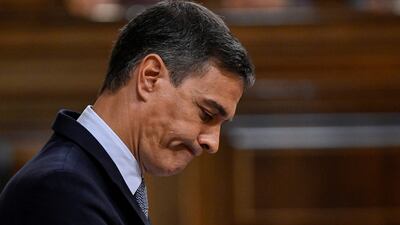Spanish Prime Minister Pedro Sanchez has called an early general election for July 23.
He said he would dissolve parliament after his party performed badly in Sunday's local elections.
In a televised address, Mr Sanchez said he had informed King Felipe VI of his decision. “I have taken this decision in light of the results of yesterday's elections.
“As the head of the government and of the Socialist party, I take responsibility for the results and I think it is necessary to respond and submit our democratic mandate to the popular will.”
His Spanish Socialist Workers' Party (PSOE) and its junior ally Podemos lost ground in the regional elections, while the conservative People's Party (PP) and far-right party Vox outperformed expectations.
“Although yesterday's elections had a local and regional scope, the meaning of the vote conveys a message that goes beyond that.”
“That is why, as both Prime Minister and the PSOE's secretary general, I personally assume [responsibility for] the results,” he added.
Before Sunday's poor results, Mr Sanchez had insisted that he would complete his four-year term, indicating that an election would be held in December.
The PP took up to eight regional governments from the Socialists, depending on how successful it is in negotiating with Vox.
If replicated in the general election, Sunday's results indicate the PP and Vox would beat the left-wing incumbent coalition.
“The sooner (the election), the better,” Alberto Nunez Feijoo, leader of the PP, told a press conference on Monday as he asked voters to give his party a “clear majority” to run the country.
“I ask Spaniards to make me Spain's next prime minister,” he said.
Vox leader Santiago Abascal said the party wanted to form national and regional governing coalitions with the mainstream conservative PP. He said Vox would be open to “creating an alternative” government.
The PP secured 31.52 per cent of the vote in the municipal elections, compared with 28.11 per cent for the Socialists.
Its support was up from 22 per cent in 2019, while Vox more than doubled its share of the vote to 7 per cent.
“This is unexpected. Sanchez is trying to short circuit the PP’s rise as soon as possible,” said Ignacio Jurado, a political scientist at Madrid’s Carlos III University.
Mr Sanchez has faced several obstacles, amid high inflation, and struggled to contain the fallout from repeated clashes between the PSOE and its far-left coalition partner Podemos.


